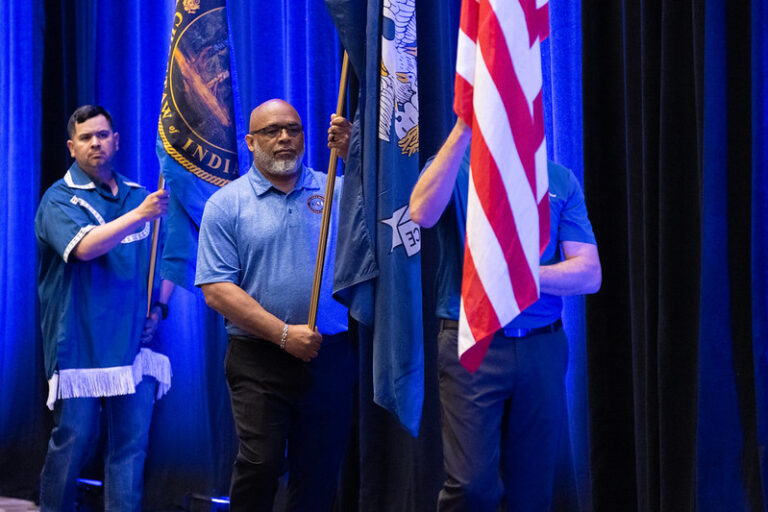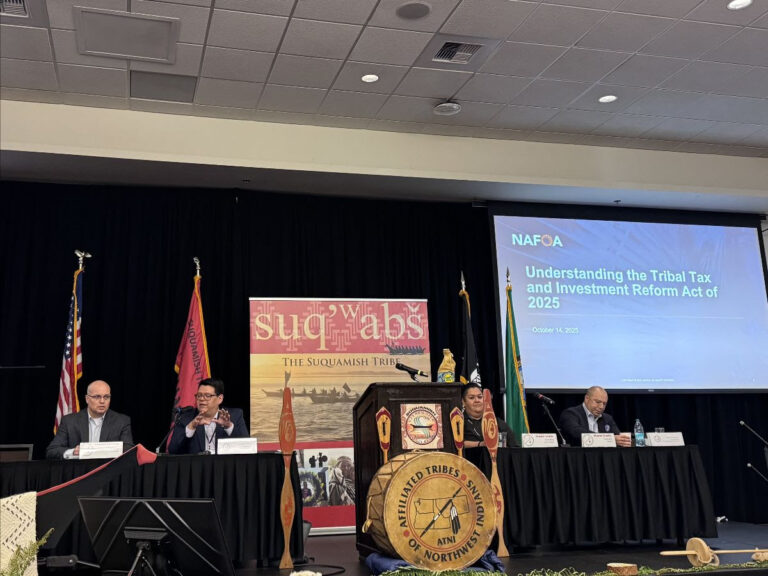1. TODAY:
NAFOA Roundtable: SSBCI In Indian Country
Monday, November 3, 2025, at 2:00 p.m. ET
NAFOA invites Tribal leaders to join a roundtable discussion on the State Small Business Credit Initiative (SSBCI).
The U.S. Department of the Treasury has confirmed that there will be no change to the SSBCI expenditure deadline. With this confirmation, NAFOA is now hosting this discussion to provide Tribes an opportunity to:
- Share experiences with SSBCI allocations, implementation, and partnerships.
- Discuss successes, challenges, and lessons learned in deploying SSBCI funds to support Tribal small businesses and entrepreneurs.
- Identify areas for continued support and technical assistance as Tribes move forward with program implementation.
Your insights and stories will help shape future dialogue and strengthen Tribal voices regarding program implementation.
This meeting will not be recorded and is not open to the press.
2. POLICY ALERT:
Treasury Releases FAQ Update to SSBCI Program, Addressing Deadlines and Disbursements
Wednesday, November 19th, 2025 at 10:00 AM PT
The U.S. Department of the Treasury has updated its Frequently Asked Questions document on the State Small Business Credit Initiative (SSBCI) program, stating that all disbursements, technical support, and other program actions performed by Treasury, as required by statute, will continue until March 11, 2028. This updated FAQ clarifies that Treasury will not be moving the expenditure deadline from October 2026 to November 2025.
Additionally, the Treasury offered updated information on funds dispersed through the Capital Program that have not been spent by statutory deadlines, as well as the deadline for final funding requests.
Treasury plans to host a call for all participating jurisdictions on Thursday, November 6, at 3 p.m. ET.
To receive the latest updates from Treasury’s SSBCI Bulletin, email SSBCI_information@treasury.gov and request to be added to the distribution list.
Register for the Call on Nov 6 →
3. MUST READ:
The Government Shutdown Shows the Need to Reform How the Federal Government Funds Native American Tribes and Communities
While the effects of the federal government’s ongoing shutdown will be widespread, it will have a particularly damaging impact on Native American Tribes and people.
The federal government maintains trust and treaty obligations to Tribal Nations, citizens, and communities that are distinct from its relationships with other groups in the United States. In exchange for the lands and natural resources that now encompass the United States, the federal government entered into treaties and passed numerous laws, which court decisions have affirmed, that obligate it to provide certain funding and services to Tribal Nations, citizens, and communities. These obligations include supporting Native Americans’ health, education, land rights, natural resources, and economic well-being, among other areas.
However, while these obligations are the United States’ oldest continuous legal commitments, they continue to be chronically underfunded and uniquely vulnerable to government shutdowns compared to other federal funding to which communities are entitled by law.
Source: Brookings Institution
4. SURVEY:
2025 Small Business Credit Survey
This voluntary survey is sponsored solely by the Federal Reserve Banks. The questions are best answered by an owner or key financial decision maker of your business and will take about 10–12 minutes.
Survey responses will be aggregated for research and analysis. The Federal Reserve Banks will not disclose individual or identifiable survey responses except to trusted service providers to prepare data for analysis under strict confidentiality guidelines or if required by law or legal process. The Federal Reserve Banks may make anonymized data publicly available.
Source: Federal Reserve Banks
5. JOB OPPORTUNITY:
Chief Financial Officer, Pechanga Band of Indians
This role requires a leader who can translate complex financial data into actionable insights, foster interdepartmental collaboration, identify opportunities for innovation and efficiency and be committed to advancing the Tribe’s economic sovereignty and prosperity for future generations.
The Chief Financial Officer (CFO) serves as a key strategic partner to the Tribal Council, providing vision, direction, and oversight for all financial operations of the Tribal Government. This position is responsible for safeguarding Tribal assets, ensuring regulatory compliance and guiding the Tribe toward sustainable economic growth. The CFO will lead the development of forward-looking financial strategies that align with the Tribe’s cultural values, long-term goals, and community priorities.




